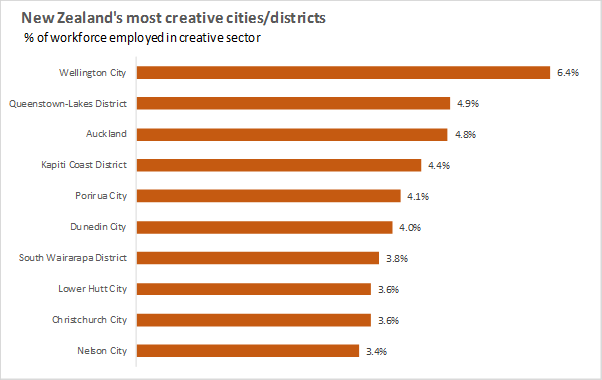
By Andrew Whiteford*

According to our Boho measure of creativity, Wellington is truly New Zealand’s most creative city.
The Boho measures the proportion of a city’s workforce that is involved in creative and artistic occupations and industries. In Wellington City, 6.4% of the population are employed in the creative sector, compared with 4.8% in Auckland. In fact Queenstown pips Auckland into third place with 4.9% of its workforce in the creative sector.

Professor Richard Florida, during his time at the Carnegie Mellon University in the US, popularised the Boho measure. He tried to demonstrate a link between the creative arts and economic development, especially in the areas of high technology. He argued that a vibrant artistic community is a necessary condition to attract talented people to fuel the knowledge economy.
Florida calculated a Boho Index for the 50 major cities in the US. His analysis showed that there is a strong correlation between the proportion of Bohemians in a city and the strength of its high tech industry. Ten of the top 15 bohemian cities number among the nation’s top 15 high technology areas.
Some of Florida’s observations ring true in New Zealand. Not only is Wellington by far the most creative city, but its economy is also by far the most knowledge intensive. 56% of Wellington’s workforce are employed in knowledge intensive industries compared with 36% in Auckland. Wellington’s creative environment is likely to improve the city’s ability to attract top talent from around the world.
With more than 10,000 people employed in it, the creative sector makes a substantial and growing contribution to Wellington City’s economy. At the beginning of the millennium the creative sector contributed slightly more than 5% of the city’s GDP. By 2016 this had risen to 6.5%. Since the end of the Global Financial Crisis, the creative sector in Wellington has grown at nearly double the rate of the rest of the local economy.
The creative sector has taken on a new importance in New Zealand with the increase in remote working. Many high-skilled jobs can now be conducted remotely with improvements in technology and changing mindsets of employers. An increasing number of professionals are moving out of the large centres to the provinces to take advantage of lower house prices, opportunities for rural lifestyles and being closer to family.
Districts and regions around New Zealand need to compete for these remote workers who can make a considerable contribution to local economies. Districts without any cultural amenities won’t get a look in with many big city refugees. When local councils are making funding decisions around cultural infrastructure they should be conscious of the impact that a creative environment can have on their local economy.
Andrew Whiteford the managing director and a senior economist at Infometrics, and is is responsible for Infometrics Regional Service.
8 Comments
Could QTN become our Los Angeles?
Probably could, good airline connections, young community, free of the limits of our old colonial cities, good climate, full on lifestyle, international reputation
Hmmm...
Yes if house prices drop down to an average of $300k - Not joking!
Good point.
They have built a Nappy Valley near the shotover, that has a familiar name.
Dont know what the houses sold for, never cared.
I was thinking of them sprawling to the Cromwell/Wanaka area lots of stoney land and lakes.
Speaking as someone who works in the Creative Tech industry, I can tell you that in order to make this industry thrive you need a much lower cost of living. The only reason why Wellington is up there on the high creative employment score is due to Weta, which is finding it harder to recruit experienced staff due to high cost of living via rents. Typically the film industry only employs on a short term contract basis since they're project based.
Why do you think Canada focused on B.C's Vancouver for the Foreign Buyers Tax; it was many due to helping their industries to keep going. Vancouver is one of the main Film Industry hubs for Canada and the US.
Most of the US's film post production work goes to Canada due to tax incentives and cheaper production costs. They had no other choice than to reduce their cost of living otherwise it would have completely killed off this vital high value creative industry.
I saw an article recently that cited data on Wellington not having the underlying fundamentals to sustain its current housing boom. That there has been insufficient population or employment boom to generate the increase in property prices and rents. So I have been casually assuming that the recent house inflation was just another sign of desperation as the Auckland housing bubble spreads sideways, as it lost impetus to continue upwards.
I do wonder if Wellington will decelerate quickly at some point soon. Affordability and sufficient rental properties is becoming a serious issue.
That said,I'm involved with Web Development, Online marketing etc and find Wellington provides a comfortable cost of living for me. In our office building, every office is art , IT and Creative Tech and appear to be thriving.
Regarding Wellington supposedly not having enough employment growth, I would not be concerned. They are probably comparing to Auckland and Christchurch that have illusory construction/ property ponzi related employment growth. And after Sept 2017, the coalition talks horse trading will likely see an expansion of the public sector
Dunedin is going gangbusters in the IT, Web and Creative work. Trouble is that the house price monster is emerging.
"knowledge intensive industries " ......... for Wellington I think this means government. Not quite a creative workforce.
We welcome your comments below. If you are not already registered, please register to comment
Remember we welcome robust, respectful and insightful debate. We don't welcome abusive or defamatory comments and will de-register those repeatedly making such comments. Our current comment policy is here.